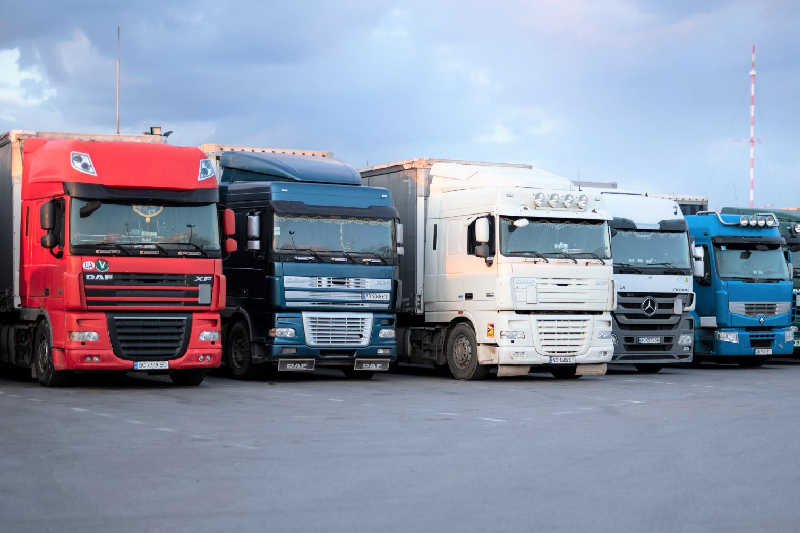
Do Ukrainian Lorry Drivers Brave the Freezing Battlefield of Polish Blockades?
A Glimpse of Light in Winter’s Darkness: New Border Checkpoints Offer Hope
In the heart of the Medyka border crossing, a frigid battleground unfolds for Ukrainian lorry drivers facing unprecedented challenges imposed by Polish blockades. The betrayal resonates among them as queues extend a staggering 70km, becoming a poignant symbol of strained relationships.
The Plight of Ukrainian Driver Vitaliy Zemyenko
Vitaliy Zemyenko, a Ukrainian lorry driver, contemplates the daunting journey ahead on a snowy road near Poland. The border crossing at Medyka, which takes nine hours to navigate, reveals a disheartening reality. While dropping off a consignment of vodka on the Polish side, the return journey has transformed into a logistical nightmare, requiring a minimum of eight days, and in the worst-case scenario, two weeks. The root cause? A sentiment echoed by many: the Poles don’t want Ukrainian drivers in the European Union.
The Escalation of Blockades
Over the past two months, Polish lorry drivers have staged blockades at three border crossings with Ukraine, escalating the protest on November 26 by including Medyka, a crucial transportation hub. This move triggered a ripple effect, with Slovakian drivers initiating their blockade near Uzhhorod. The Polish drivers advocate for the restoration of a transport permit scheme that capped Ukrainian entries at 200,000 per year, asserting that the post-2022 lifting of restrictions has significantly impacted their earnings.
A Geopolitical Chessboard
As the standoff persists, queues at the Medyka crossing grow longer, stretching approximately 70kms, making it a logistical nightmare for the 2,500 lorries inching forward at a pace of half a kilometer every nine hours. Ukrainian drivers express frustration, lamenting the alleged deliberate negligence by the Polish authorities. The implications are profound, with accusations of Kremlin involvement gaining traction, fueled by suspicions that Russian interests benefit from the chaos.
Dueling Narratives: Union Protests vs. Economic Competition
Polish unions counter this narrative, emphasizing the authenticity of a working-class protest. They argue that logistical companies in Europe, particularly in Poland, struggle to compete with Ukrainian drivers operating under different regulatory frameworks. Their demand is clear: reinstate the pre-2022 system of transport permits. The outgoing Polish government has been cautious in handling the situation, with Prime Minister Mateusz Morawiecki asserting a strong demand for the restoration of transport permits.
The Uncertain Future and Diplomatic Moves
The impending political transition in Poland, with Donald Tusk poised to become the next prime minister, adds uncertainty to the resolution of the crisis. Kyiv attempts to alleviate the situation by opening a new border checkpoint for empty lorries returning home, signaling a potential breakthrough after lengthy negotiations with Warsaw. However, Ukraine’s President Zelenskiy downplays the dispute, urging patience and downplaying the magnitude of the conflict.
Keep Reading
Humanitarian Impact and Geopolitical Struggles
The blockade’s consequences extend beyond geopolitical maneuvering, impacting essential supplies and leaving drivers caught in the crossfire. The Medyka crossing, once a vital hub for military and humanitarian supplies, now stands as a symbol of strained relations. The blockade’s pledge not to hinder essential aid vehicles faces practical challenges, with stranded lorries and makeshift barriers complicating matters.
A Glimmer of Hope: New Border Checkpoints
In response to the crisis, a new border checkpoint opens between Uhryniv and Dołhobyczów, offering a ray of hope. This addition, catering to empty lorries returning home, aims to decrease the seemingly endless queues. The diplomatic efforts between Ukraine and Poland underscore the complex interplay between geopolitical tensions and practical challenges faced by lorry drivers.
Lorry Drivers Caught in the Crossfire
As Ukrainian drivers await their turn at the Medyka crossing, the winter landscape becomes a backdrop to their struggles. The introduction of a new electronic queuing system provides some relief, allowing drivers an allocated slot and the luxury of spending time at home between journeys. However, the stark reality remains – their livelihoods, once thriving with two trips a month, have dwindled to one trip every six weeks, making survival in the queue an additional financial burden.
A Geopolitical Quagmire with Human Costs
The plight of Ukrainian lorry drivers entangled in Polish blockades reflects a broader geopolitical quagmire. While diplomatic negotiations and new border checkpoints offer glimmers of hope, the enduring queues and strained relations underscore the human cost of such conflicts. As the world watches, the fate of these drivers remains entwined with the delicate balance of diplomatic resolutions and the geopolitical chessboard.

